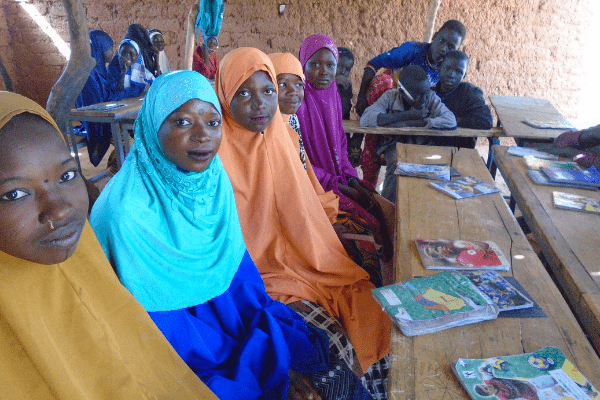Education mandate in Niger
Offering an alternative education to out-of-school young people to enable them to return to school or vocational training
In Niger, a very high number of young people have not attended school or had to leave early. This was due to population displacements as a result of various armed conflicts, as well as the unsuitability of State education programmes to meet the requirements of children or to address the concerns of populations.
For most children, starting or returning to school is impossible. In State schools, lessons are given in French, the official language, which is not understood by the majority of children whose mother tongue is one of the eleven local languages in Niger. So young people fail in school and have to leave without having acquired basic knowledge. In 2017, more than 1,200,000 adolescents were affected.
Intervention mandate from Swiss Cooperation
 © SwisscontactTo improve the situation, the State of Niger, together with the communes, has developed Community Centres of Alternative Education for Young People (CCEAJ). Enfants du Monde works in these Centres in the Dosso and Maradi regions, mandated by the Swiss Directorate for the Developement and Cooperation, in collaboration with the NGO Swisscontact.
© SwisscontactTo improve the situation, the State of Niger, together with the communes, has developed Community Centres of Alternative Education for Young People (CCEAJ). Enfants du Monde works in these Centres in the Dosso and Maradi regions, mandated by the Swiss Directorate for the Developement and Cooperation, in collaboration with the NGO Swisscontact.
The aim of this mandate is firstly to adapt education to the linguistic and local context, so that children can return to school or vocational training, and secondly, to strengthen the capacity of the teaching body to provide long-term improvement in the quality of education.
Our impact in the field
Between 2019 and 2022 :
- 315 Centres of alternative education for young people opened in the Dosso and Maradi regions
- 15'000 young people aged 9 to 14, out-of-school or dropped out early, received an education adapted to their needs
- 300 teachers trained by Enfants du Monde
Learning to read, write and count through work-related topics
Reading and writing exercises, learning vocabulary, maths problems or natural science activities, are focused on finding out about the different jobs in key sectors of the local economy such as agriculture, metal-working or jewellery making. The content covered is developed directly from contributions made by local professionals, thus involving support from the community and from parents.
Focusing on occupations is important because it brings young people back into school and raises the status of our jobs in their eyes.
Encouraging critical thinking by looking ahead to the world of work
Our Swiss NGO places great emphasis on the participation of the students, especially the keeping of a “trades logbook”. The knowledge acquired about trades is also linked with greater issues. While studying market gardening practices for example, the conservation of water and soils is also covered as well as the land question.
Bilingual teaching in local languages and in French
 Centre of Guidan Atchali © SwisscontactThe teaching is designed so that the students learn to express themselves in two languages, their mother tongue and French. In this way, the national languages (Fulfulde, Zarma and Hausa) and French are both subjects and a vehicle for knowledge.
Centre of Guidan Atchali © SwisscontactThe teaching is designed so that the students learn to express themselves in two languages, their mother tongue and French. In this way, the national languages (Fulfulde, Zarma and Hausa) and French are both subjects and a vehicle for knowledge.
Failing at State school, girls at the Guidan Atchali CCEAJ rediscovered their zest for learning thanks to bilingual teaching.
Here, we are successfully learning to read and write in French, because two languages are used in class and that helps us to understand.
Educational and training material developed by Nigeriens for Nigeriens
Textbooks and teachers’ guides are produced by staff at the Ministry of Education in Niger, trained by education specialists from Enfants du Monde. The staff then train teachers directly, thus ensuring the establishment and continuity of the pedagogic approaches promoted by Enfants du Monde.
